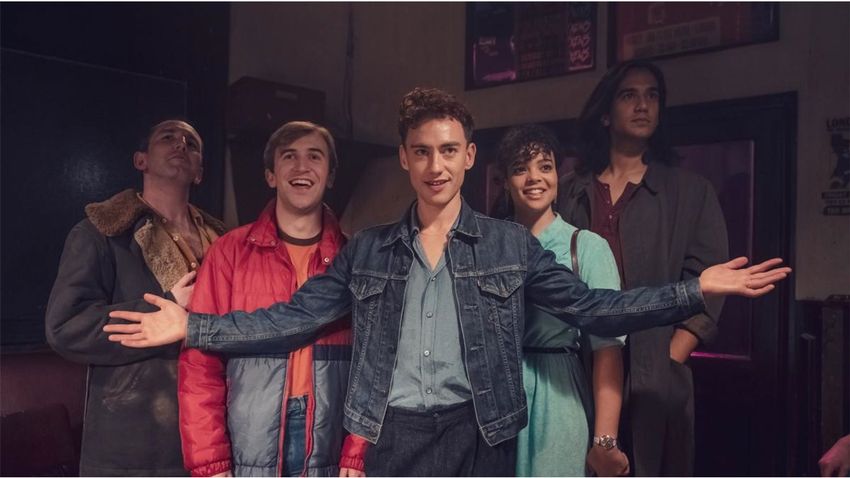
Watch
It’s a Sin review
Any good review of It’s a Sin should be subjective and impersonal, possibly finding fault in the casting or in the way gay men are portrayed dying from HIV & AIDS, but this is not going to be that type of review. The story is very personal to show creator Russell T. Davies, both from his lived experience and based on the characters he created.
It’s a Sin tells the story of five friends, who at the end of the first episode, come together as roommates, and form their own family. The next four episodes span an entire decade up to the end of 1991. Over the ten years we watch these 20-year-olds enjoy London’s free gay life as the epidemic evolves from ‘gay cancer’ and GRID finally to HIV/AIDS.
At this point I’m going to warn you before you continue reading, not for the spoilers (that will come later), but for the emotional journey It’s a Sin will take you on. This series is about HIV/AIDS and characters will die. There’s plenty of foreshadowing to help you know who will die, but it’s still going to hurt to watch it happen.
Simply put, every episode made me cry. The first three episodes concluded with tears, and the last two were tear filled throughout. As was the near sleepless night after finishing the series. I give a lot of the credit to Davies’ amazing writing and to the incredibly strong acting out of every performer.

Authentic character controversy
A lot of controversy was created in the press recently by people misinterpreting Davies’ comments about casting gay men to fill these roles. We can save the debate about whether only gay men should play gay roles for another time. Davies wanted authenticity, and frankly, he bloody got it. One actor is even positive.
Now I know straight actors can win Oscars for portraying gay men (three cheers for straight white men getting even more praise), and any good actor should be able to dig deep and find enough empathy to make their emotions believable, but that only goes so far. More than representation, it could be so easy for these characters to become stereotypes, especially as they are composite characters rather than specific people. For actors who are themselves gay, they brought themselves to the role.
I was excited for this series from the moment I saw Olly Alexander tweet out a cast photo with him decked out in the 80s. And I mostly ignored the underlying HIV/AIDS theme, focusing on the group of gay men in 80s London. Call it denial, or being naive, but it may certainly be true of how those men avoided the dark truth back then. (Or how anyone can be convinced the current pandemic is a hoax).
The second assumption I made was that this would be a show starring Olly Alexander. And while his character, Ritchie, and the motivations that drive him, is central to the storyline, it’s the character Jill Baxter who is the cornerstone of the entire series, for a pretty good reason. Lydia West had previously wowed audiences in Davies’ last series, Years and Years, and I suspect her powerful performance there lead to this role. Lydia’s character throughout the series was remarkable, right until the very last scene. She’s not a surviver, or merely an observer, she was an active participant watching her loved ones die.

Along with Olly and Lydia, the primary cast (and flatmates) was complete with Omari Douglas (Roscoe), Callum Scott Howells (Colin) and Nathaniel Curtis (Ash). Additionally we get strong performances from Neil Patrick Harris, Stephen Fry, and Tracy Ann Oberman.
Olly has already gone back to his music, and while I’m sure he’ll win a TV BAFTA (he so deserves one), Lydia’s acting career is about to take off. (Also, she’d better win a BAFTA for that performance).
Ritchie, and the other gay men, are composite characters, representing an ideal for the story, with one exception. In one scene Ritchie plays Trooper Linden in a fictional Doctor Who episode, as a tribute to Dursley McLinden, a friend of Davies’ who did appear in a real Doctor Who episode and who died from AIDS related complications). But one character is more real.
In the last two episodes we get two new characters, Jill’s mum and dad played by Jill Nalder and Steve Toussaint. Jill Baxter is ‘loosely’ based on the real life Jill Nalder, who is a friend of Davies. For all the hype and eye-candy with all the beautiful boys, I honestly think Jill is the primary character (or West just carried the series). The real life Nalder is an actor who performed for many years in Les Mis (referenced in the series), and she’s known for her many years of HIV/AIDS activism. Nalder shared stories with Davis, and with some dramatic liberty we get Jill Baxter.
There’s another actor in this who I’ve long admired from Spooks to Ashes to Ashes, Keeley Hawes playing Ritchie’s mum Valerie Tozer. While her performance was brilliant, her character was so mean, and in her final scene, I had to shout at the screen when she dropped a bomb, or rather metaphorically twisted the knife she’d already stabbed. What her character does is so genuinely cruel. Jill gets the last word, and puts Valerie in her place with a final monologue to help sum up the previous decade.

The boys go home
Russell T. Davis will often employ a phrase repeated differently throughout a series. It’s done subtly, but it somehow carries incredible meaning and presence. In It’s a Sin, the phrase ‘in the end, the boys go home’ seemed to resonate the most. It goes beyond just the series, although it’s more of that strong foreshadowing, tragically or for healing. But it speaks to what the gay community was like in the 80s, watching men vanish, back home or simply forgotten.
The scenes are there throughout, the men dying alone and disposed of, or taken by family to die in shame with their lives burned away. It makes you wonder what the real death toll is from HIV/AIDS. And shame plays a huge part, both for the families, for Ritchie, and for patients dying alone in the hospital. It breaks your heart. After fighting to be open and free, shame drove people back.
With all the warnings in the world, It’s a Sin is a very hard series to watch, and harder to avoid. Others may be critical of the casting or inclusion of particular characters or portions of the community, but it’s also an unflinching raw reminder that our community is missing a lot of elders. We must never forget, even if some many names have been lost.
Watch It’s a Sin on 4onDemand or HBO Max. The series can also be bought on iTunes/Apple TV